Lemon balm tea is a natural stress buster thanks to its powerful calming compounds. It increases GABA levels in your brain, reducing anxiety and promoting relaxation. The herb's active ingredients, like rosmarinic acid and eugenol, work together to ease tension and improve mood. When you drink lemon balm tea, it can lower cortisol levels, helping you feel more balanced and less stressed. Its long history of use for anxiety relief spans centuries, from ancient Greece to modern times. By incorporating this soothing brew into your routine, you'll tap into nature's remedy for a calmer mind and body. Discover how this simple cup can transform your stress management approach.
Lemon Balm's Calming Properties
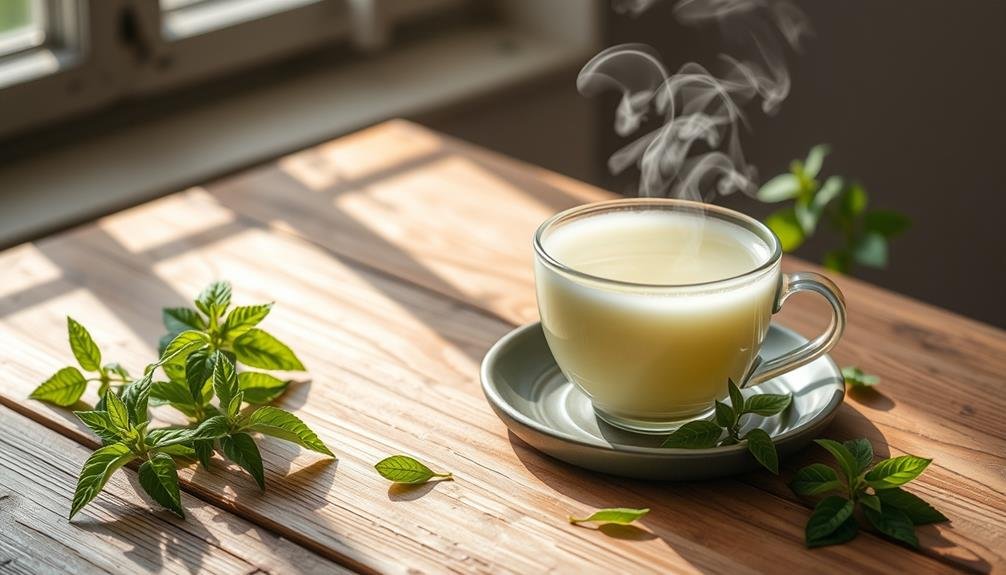
Renowned for its soothing effects, lemon balm has been used for centuries to calm nerves and reduce anxiety. This herb contains compounds that interact with your body's nervous system, promoting relaxation and easing stress. When you drink lemon balm tea, you're ingesting natural chemicals that can help regulate your mood and reduce feelings of tension.
Lemon balm's calming properties stem from its active ingredients, including rosmarinic acid and eugenol. These compounds work by increasing levels of GABA (gamma-aminobutyric acid) in your brain, a neurotransmitter that helps control stress and anxiety.
Additionally, lemon balm has been shown to reduce cortisol levels, the hormone associated with stress responses.
You'll find that regular consumption of lemon balm tea can lead to improved sleep quality, decreased restlessness, and a general sense of calm.
It's also been linked to enhanced cognitive function, helping you stay focused and alert without feeling jittery. Unlike some prescription medications, lemon balm doesn't cause drowsiness or impair your ability to concentrate, making it an excellent natural alternative for managing daily stress and anxiety.
Historical Use for Stress Relief
You'll find lemon balm's stress-relieving properties have been recognized for millennia, dating back to ancient Greece where it was used to treat anxiety and promote sleep.
In medieval Europe, you'd see lemon balm incorporated into tonics and elixirs aimed at calming nerves and lifting spirits.
Traditional folk medicine practices across cultures have long embraced lemon balm for its soothing effects, often recommending it for restlessness and tension.
Ancient Greek Medicinal Uses
The ancient Greeks recognized lemon balm's calming properties long before modern science confirmed its stress-relieving effects. They called it "melissa," meaning "honey bee," due to its ability to attract bees.
You'll find that Greek physicians, including Dioscorides and Pliny the Elder, documented lemon balm's medicinal uses in their writings.
In ancient Greek medicine, lemon balm was used to treat a variety of ailments related to stress and anxiety. They believed it could soothe nervousness, promote restful sleep, and ease digestive issues often associated with stress.
You'd have found lemon balm prescribed for melancholy, a condition we now recognize as depression.
Greek healers also used lemon balm to address physical symptoms of stress, such as headaches and heart palpitations. They'd often combine it with other herbs in teas or tinctures to enhance its calming effects.
The Greeks even applied lemon balm topically, believing it could relieve tension and promote overall well-being.
This early recognition of lemon balm's stress-relieving properties laid the foundation for its continued use throughout history, eventually leading to modern scientific studies that validate many of these ancient claims.
Medieval European Remedies
As lemon balm's reputation for stress relief spread from ancient Greece, medieval European herbalists and physicians embraced its therapeutic properties.
You'd find lemon balm in monastery gardens, where monks cultivated it for its calming effects. They'd use it to treat melancholy, anxiety, and restlessness in their patients.
During the Middle Ages, lemon balm became a key ingredient in Carmelite Water, a popular tonic believed to improve mood and cognitive function.
You might've encountered this remedy if you lived in 14th-century Europe, as it was widely used to combat stress-related ailments.
Medieval healers often prescribed lemon balm tea to ease tension headaches and promote better sleep.
They'd also recommend it for digestive issues, which they believed were closely linked to stress and anxiety.
You'd likely have been advised to drink the tea regularly or apply it topically as a compress.
Traditional Folk Medicine Applications
How did lemon balm tea find its way into traditional folk medicine practices? For centuries, people have turned to this fragrant herb for its calming properties. You'll find lemon balm deeply rooted in various cultures' healing traditions, where it's been used to soothe anxiety, promote relaxation, and improve sleep quality.
In folk medicine, lemon balm tea was often prescribed for:
- Easing nervous tension and stress
- Alleviating mild depression and mood swings
- Reducing headaches and migraines
- Improving digestion and reducing stomach discomfort
- Enhancing cognitive function and memory
Traditional healers recognized lemon balm's potential to calm the nervous system and restore balance to the body and mind. They'd often combine it with other herbs like chamomile or valerian root for enhanced effects.
The tea was typically prepared by steeping fresh or dried leaves in hot water, allowing the plant's beneficial compounds to infuse into the drink.
As word of lemon balm's stress-relieving properties spread, it became a staple in home remedies across Europe and beyond. Its popularity in folk medicine paved the way for modern scientific research into its potential health benefits.
Active Compounds in Lemon Balm
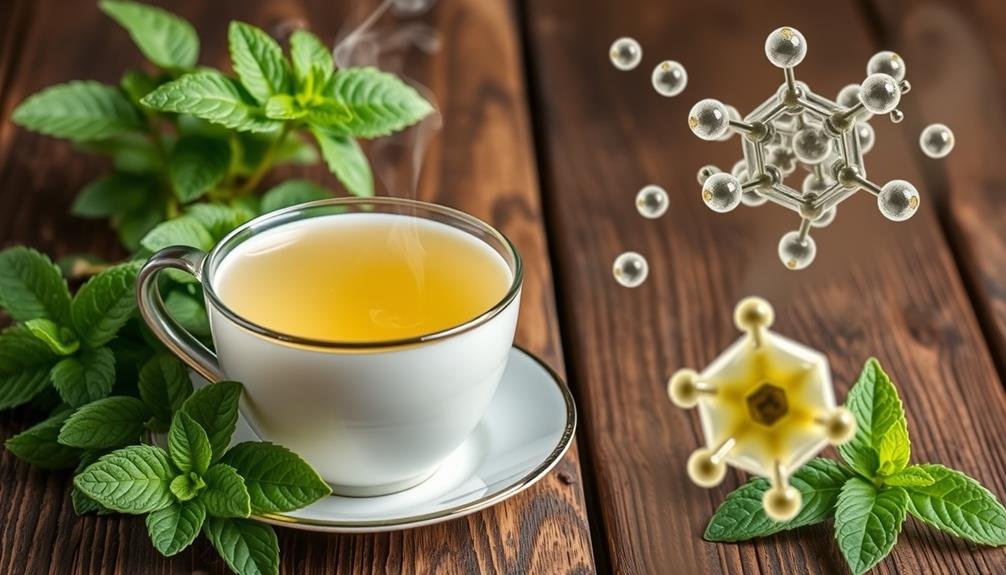
Several key compounds in lemon balm contribute to its stress-relieving properties. You'll find a variety of active ingredients that work together to create the herb's calming effects. These include rosmarinic acid, which has potent antioxidant and anti-inflammatory properties, and eugenol, known for its soothing aroma and mild sedative effects.
Lemon balm also contains terpenes like citronellal and citral, responsible for its characteristic lemon scent. These compounds have been shown to reduce anxiety and promote relaxation. Additionally, you'll benefit from flavonoids that support overall brain health and cognitive function.
Here's a breakdown of the main active compounds in lemon balm and their effects:
| Compound | Properties | Benefits |
|---|---|---|
| Rosmarinic acid | Antioxidant, anti-inflammatory | Reduces oxidative stress |
| Eugenol | Aromatic, mild sedative | Promotes relaxation |
| Citronellal | Terpene, aromatic | Reduces anxiety |
| Flavonoids | Neuroprotective | Supports cognitive function |
Effects on Neurotransmitters
When you drink lemon balm tea, you're influencing key neurotransmitters in your brain.
The tea activates GABA receptors, which help calm your nervous system and reduce anxiety.
Additionally, lemon balm can increase serotonin levels, potentially improving your mood and overall sense of well-being.
GABA Receptor Activation
One of the key mechanisms behind lemon balm's stress-relieving properties is its ability to activate GABA receptors in the brain. GABA (gamma-aminobutyric acid) is a neurotransmitter that plays a vital role in regulating anxiety and promoting relaxation. When lemon balm compounds bind to GABA receptors, they enhance the inhibitory effects of this neurotransmitter, leading to a calming effect on your nervous system.
By activating GABA receptors, lemon balm tea can help you experience:
- Reduced anxiety and stress levels
- Improved mood and emotional balance
- Enhanced cognitive function and mental clarity
- Better sleep quality and duration
- Decreased muscle tension and physical discomfort
This GABA receptor activation is particularly beneficial if you're dealing with chronic stress or anxiety disorders. The natural compounds in lemon balm, such as rosmarinic acid and citronellal, work synergistically to boost GABA's effectiveness.
As you sip on lemon balm tea, these compounds interact with your brain's receptors, promoting a sense of calm and well-being. Regular consumption of lemon balm tea can help maintain ideal GABA levels, potentially leading to long-term improvements in your stress management abilities and overall mental health.
Serotonin Level Increase
Happiness and well-being often stem from balanced brain chemistry, and lemon balm tea can play an essential role in this process. This herbal remedy has been shown to increase serotonin levels in the brain, a neurotransmitter closely associated with mood regulation and emotional stability.
When you drink lemon balm tea, its active compounds interact with your brain's serotonin receptors, potentially boosting the availability and effectiveness of this vital neurotransmitter. This increase in serotonin can lead to improved mood, reduced anxiety, and a greater sense of calm and contentment.
The tea's serotonin-enhancing properties may also contribute to better sleep quality, as serotonin is a precursor to melatonin, the hormone responsible for regulating your sleep-wake cycle. By promoting healthy serotonin levels, lemon balm tea can help you maintain a more balanced emotional state throughout the day and improve your overall sleep patterns.
Regular consumption of lemon balm tea may provide cumulative benefits, helping you build resilience against stress and maintain a more positive outlook.
It's a natural and gentle way to support your brain's chemistry and promote emotional well-being without the side effects often associated with pharmaceutical interventions.
Anxiety-Reducing Potential
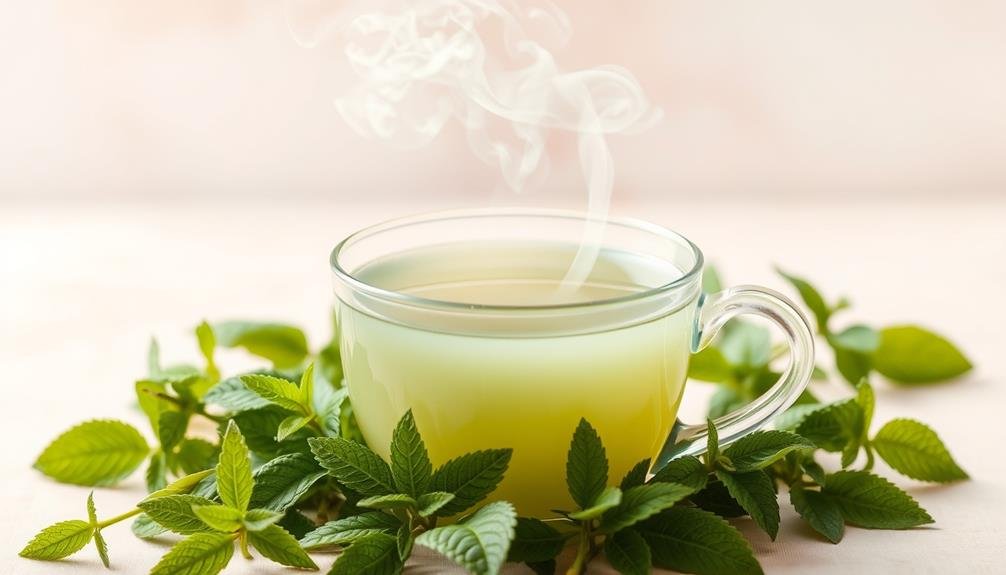
Beyond its pleasant aroma and flavor, lemon balm tea shows promising potential for reducing anxiety. Research suggests that compounds in lemon balm interact with GABA receptors in your brain, promoting relaxation and calmness. This interaction may help alleviate symptoms of anxiety and stress, making it an excellent natural option for those seeking relief.
When you're feeling anxious, a cup of lemon balm tea can provide a soothing experience. It's believed to help reduce cortisol levels, the stress hormone that can contribute to feelings of unease. Additionally, lemon balm's mild sedative properties may help calm racing thoughts and promote a sense of tranquility.
To maximize the anxiety-reducing benefits of lemon balm tea, consider these tips:
- Steep the tea for 5-10 minutes to extract its beneficial compounds
- Drink it regularly, preferably in the evening to promote relaxation
- Combine it with other calming herbs like chamomile or lavender
- Practice deep breathing while sipping your tea
- Create a peaceful environment to enhance its effects
Sleep Quality Improvement
Lemon balm tea's benefits extend beyond anxiety relief to improving sleep quality. If you're struggling with insomnia or poor sleep patterns, this herbal remedy might be your natural solution. Studies have shown that lemon balm can increase GABA levels in the brain, a neurotransmitter that promotes relaxation and better sleep.
When you drink lemon balm tea before bedtime, you're likely to fall asleep faster and experience more restful sleep. It helps calm your mind and body, reducing the racing thoughts that often keep you awake. The tea's mild sedative effects can also increase your sleep duration, allowing you to wake up feeling more refreshed.
Moreover, lemon balm tea can improve your sleep quality by reducing nighttime disturbances. It may help minimize sleep interruptions caused by stress or anxiety, leading to more continuous and restorative sleep cycles.
Regular consumption can also establish a healthy sleep routine, signaling to your body that it's time to wind down. By incorporating lemon balm tea into your nightly ritual, you're setting the stage for better sleep and, consequently, improved daytime functioning and overall well-being.
Cognitive Function Enhancement

Lemon balm tea can give your brain a boost, improving both memory and focus.
You might find it easier to concentrate and recall information after sipping this herbal brew.
Regular consumption may even help protect against cognitive decline as you age, making it a smart addition to your daily routine.
Memory and Focus Boost
A lesser-known benefit of lemon balm tea is its potential to enhance cognitive function. This aromatic herb isn't just a stress-buster; it can also sharpen your memory and improve your focus. Research suggests that lemon balm contains compounds that interact with neurotransmitters in your brain, potentially boosting cognitive performance.
When you drink lemon balm tea regularly, you might notice improvements in your ability to concentrate and recall information. It's particularly beneficial for tasks requiring sustained attention. Some studies have shown that lemon balm can enhance working memory, which is vital for problem-solving and decision-making.
Here's how lemon balm tea can boost your memory and focus:
- Increases acetylcholine levels, a neurotransmitter essential for memory
- Reduces oxidative stress in the brain, protecting cognitive function
- Improves mood, which indirectly enhances focus and concentration
- Promotes better sleep quality, leading to improved cognitive performance
- Enhances alertness without the jitters associated with caffeine
While more research is needed to fully understand lemon balm's cognitive benefits, incorporating this tea into your daily routine may help you stay sharp and focused throughout the day.
Cognitive Decline Prevention
Building on its cognitive-enhancing properties, lemon balm tea may also play a role in preventing age-related cognitive decline. As you age, your brain becomes more susceptible to oxidative stress and inflammation, which can lead to memory loss and decreased cognitive function.
Lemon balm's antioxidant compounds, including rosmarinic acid and flavonoids, help combat these damaging effects. Research suggests that regularly consuming lemon balm tea can protect your brain cells from oxidative damage and reduce the risk of neurodegenerative diseases like Alzheimer's.
The herb's ability to modulate neurotransmitters, particularly acetylcholine, is essential in maintaining cognitive function as you grow older. By increasing acetylcholine levels, lemon balm helps improve memory retention and slows cognitive decline.
Moreover, lemon balm's anti-inflammatory properties can reduce brain inflammation, a key factor in cognitive deterioration. By incorporating this herbal tea into your daily routine, you're providing your brain with neuroprotective compounds that support long-term cognitive health.
While it's not a cure-all, lemon balm tea can be a valuable addition to a brain-healthy lifestyle, potentially helping you maintain sharper cognitive function well into your later years.
Antioxidant Benefits
Three key antioxidants found in lemon balm tea contribute to its stress-relieving properties. These antioxidants are rosmarinic acid, caffeic acid, and ferulic acid. They work together to combat oxidative stress in your body, which can be a significant factor in anxiety and stress-related symptoms.
When you drink lemon balm tea, you're giving your body a powerful antioxidant boost. These compounds help neutralize free radicals, reducing cellular damage and inflammation. This antioxidant action not only supports your overall health but also plays an essential role in managing stress levels.
The antioxidants in lemon balm tea can:
- Protect your brain cells from oxidative damage
- Support healthy immune function
- Reduce inflammation throughout your body
- Improve your skin's appearance and health
- Enhance your body's natural detoxification processes
Digestive Health Support

While lemon balm tea's antioxidant benefits are impressive, its positive effects on digestive health are equally remarkable.
You'll find that this soothing herb can help alleviate various gastrointestinal issues, making it a go-to remedy for digestive discomfort.
Lemon balm tea acts as a natural antispasmodic, reducing abdominal cramps and bloating. It can ease the symptoms of indigestion, helping to relieve nausea and heartburn.
If you're prone to gas or flatulence, you'll appreciate how this tea can help reduce these uncomfortable symptoms.
For those with irritable bowel syndrome (IBS), lemon balm tea may offer relief by calming the digestive tract and reducing inflammation.
It's also been shown to improve appetite and aid in proper digestion.
The tea's carminative properties help expel gas from the intestines, reducing discomfort and bloating.
Additionally, it can stimulate the production of bile, which aids in the breakdown of fats and promotes better overall digestion.
Mood-Boosting Effects
Lemon balm tea's mood-boosting effects are one of its most cherished benefits. This natural remedy has been shown to improve overall mental well-being and reduce symptoms of anxiety and stress.
When you drink lemon balm tea, you're tapping into its ability to calm your nervous system and promote relaxation. The tea's soothing properties can help you feel more balanced and centered, even during hectic times.
It's known to enhance cognitive function, improving focus and mental clarity. You'll likely notice a gentle uplift in your mood, helping you face daily challenges with a more positive outlook.
To fully enjoy lemon balm tea's mood-boosting effects:
- Brew a cup when you're feeling overwhelmed
- Sip slowly and mindfully to maximize relaxation
- Drink it regularly to maintain consistent benefits
- Combine with other stress-relief practices like meditation
- Try it both hot and iced for variety
Preparation Methods for Tea
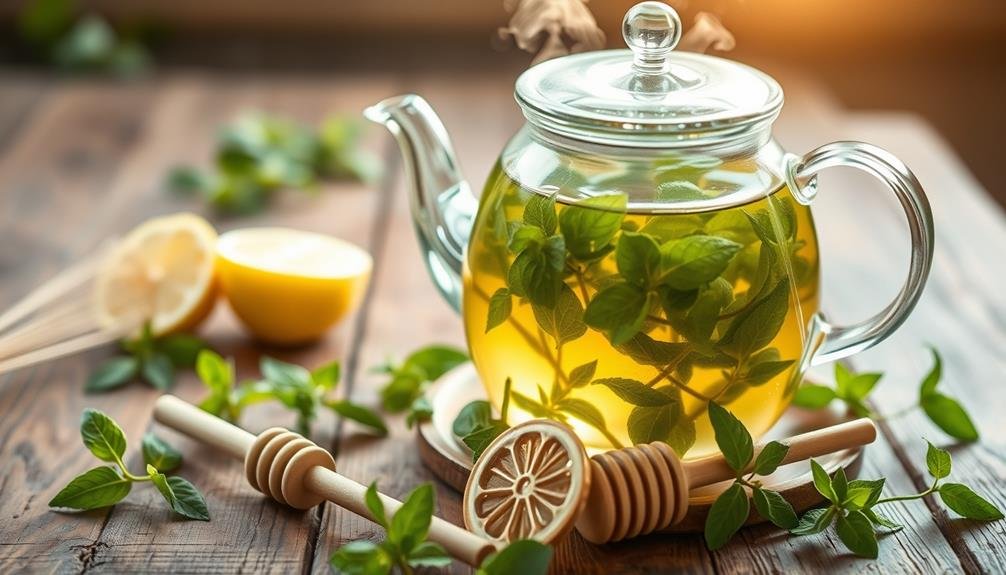
Brewing the perfect cup of lemon balm tea is simple and rewarding. To start, you'll need fresh or dried lemon balm leaves. If using fresh leaves, gather about 2-3 tablespoons per cup of water. For dried leaves, use 1-2 teaspoons per cup.
Bring water to a boil, then remove it from heat and let it cool for a minute. This guarantees you don't scald the leaves, which can lead to a bitter taste. Place the leaves in a tea infuser or directly in your cup. Pour the hot water over the leaves and steep for 5-10 minutes, depending on your desired strength.
If you're using fresh leaves, you can also try a cold brew method. Simply place the leaves in cold water and refrigerate overnight. This results in a milder, invigorating drink.
For a stronger medicinal effect, you can make a lemon balm infusion. Use 1 ounce of dried leaves per quart of water. Steep for 4 hours or overnight. Strain and drink throughout the day.
Dosage and Safety Considerations
Most people can safely enjoy lemon balm tea in moderate amounts. Generally, it's advisable to consume 1-3 cups daily. Start with a lower dose and gradually increase it to assess your tolerance.
If you're pregnant, nursing, or taking medications, consult your healthcare provider before incorporating lemon balm tea into your routine.
While lemon balm is generally safe, it's important to be aware of potential side effects and interactions. Some people may experience mild symptoms like nausea, vomiting, or dizziness.
Lemon balm can also interact with certain medications, particularly thyroid medications and sedatives.
To guarantee you're using lemon balm tea safely and effectively for stress relief, keep these points in mind:
- Don't exceed recommended dosages
- Be cautious if you have thyroid issues
- Avoid combining with alcohol or sedatives
- Stop use if you experience adverse reactions
- Purchase from reputable sources to guarantee quality
Combining With Other Stress-Relieving Herbs

While lemon balm tea is effective on its own, you can enhance its stress-relieving properties by combining it with other calming herbs. Think about blending lemon balm with chamomile, lavender, or passionflower for a more potent relaxation brew. These herbs complement lemon balm's soothing effects and can create a synergistic impact on your stress levels.
When creating your custom stress-busting blend, experiment with different ratios to find the perfect combination that works for you. Start with equal parts of each herb and adjust based on your preference and desired effects. Remember to think about any potential interactions with medications or health conditions before adding new herbs to your routine.
Here's a quick guide to some popular stress-relieving herb combinations:
| Herb Combination | Benefits | Flavor Profile |
|---|---|---|
| Lemon Balm + Chamomile | Calming, sleep-promoting | Floral, citrusy |
| Lemon Balm + Lavender | Anxiety-reducing, relaxing | Aromatic, soothing |
| Lemon Balm + Passionflower | Mood-boosting, sedative | Earthy, mild |
| Lemon Balm + Peppermint | Digestive aid, uplifting | Invigorating, minty |
| Lemon Balm + Holy Basil | Stress-reducing, adaptogenic | Spicy, sweet |
Frequently Asked Questions
Can Lemon Balm Tea Interact With Prescription Medications?
Yes, lemon balm tea can interact with certain medications. You should consult your doctor before drinking it if you're taking thyroid medications, sedatives, or HIV treatments. It's always best to check for potential interactions with your prescriptions.
Is Lemon Balm Tea Safe for Pregnant or Breastfeeding Women?
You should consult your healthcare provider before drinking lemon balm tea while pregnant or breastfeeding. It's generally considered safe in moderation, but there's limited research on its effects during these periods. Always prioritize your safety and follow medical advice.
How Long Does It Take to Feel the Effects of Lemon Balm Tea?
You'll typically feel lemon balm tea's calming effects within 15-30 minutes after drinking. The duration can vary, but you might experience reduced stress and improved mood for 2-3 hours. Individual responses may differ, so pay attention to your body's reaction.
Can Children Safely Consume Lemon Balm Tea for Stress Relief?
You can give children lemon balm tea for stress relief, but use caution. It's generally safe in small amounts, but consult your pediatrician first. Start with weak tea and monitor for any side effects. Don't give it to infants.
Does Lemon Balm Tea Have Any Caffeine Content?
You'll be pleased to know that lemon balm tea is naturally caffeine-free. It's not derived from the tea plant, but from the lemon balm herb. You can enjoy it any time without worrying about caffeine-related side effects.
In Summary
You've discovered the natural stress-busting power of lemon balm tea. Its active compounds work on your brain's neurotransmitters, reducing anxiety and boosting mood. As you sip this calming brew, you're tapping into centuries of traditional use. Remember to prepare it properly and consider safe dosages. For an extra relaxation boost, try combining it with other soothing herbs. Embrace lemon balm tea as part of your stress-relief toolkit and feel the tension melt away.

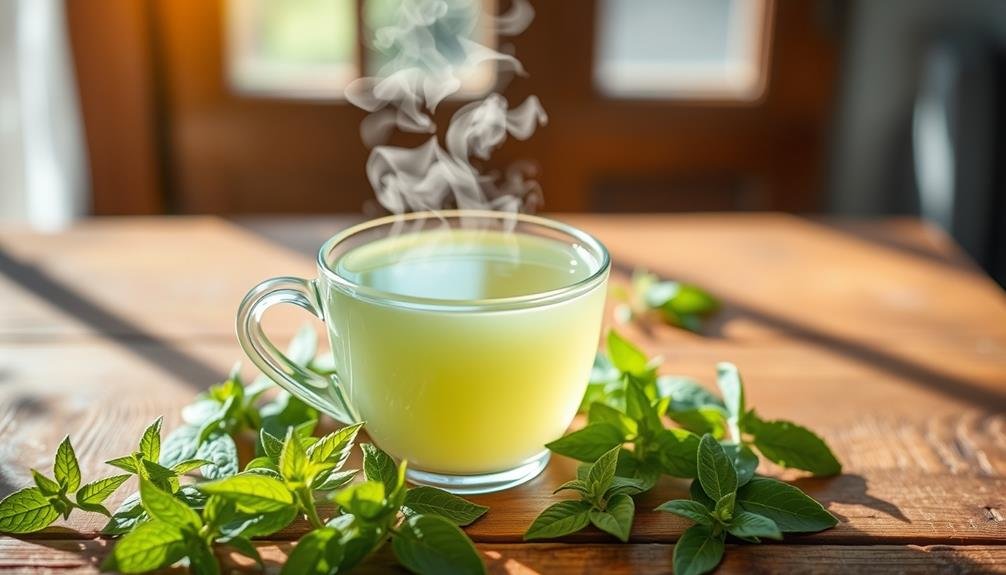



Leave a Reply